外研版(2019)选择性必修 第四册Unit 4 Everyday economics Listening and speaking课件(共14张PPT)
文档属性
| 名称 | 外研版(2019)选择性必修 第四册Unit 4 Everyday economics Listening and speaking课件(共14张PPT) | 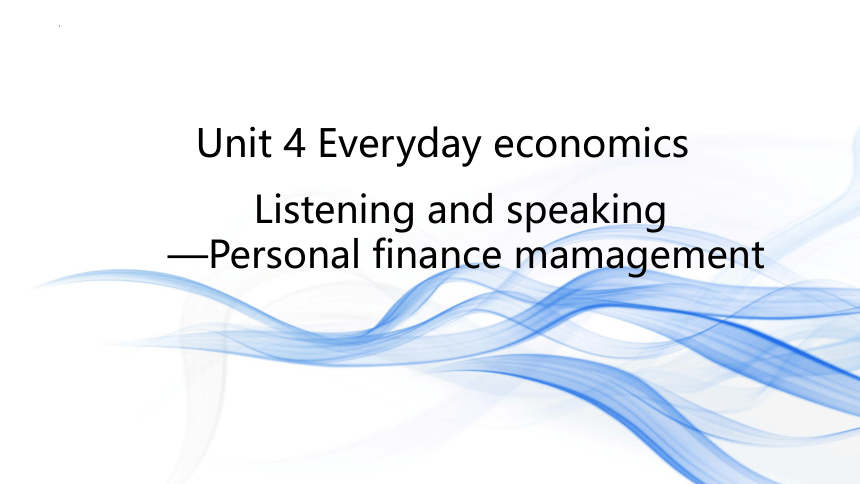 | |
| 格式 | pptx | ||
| 文件大小 | 6.1MB | ||
| 资源类型 | 教案 | ||
| 版本资源 | 外研版(2019) | ||
| 科目 | 英语 | ||
| 更新时间 | 2023-05-23 18:26:13 | ||
图片预览

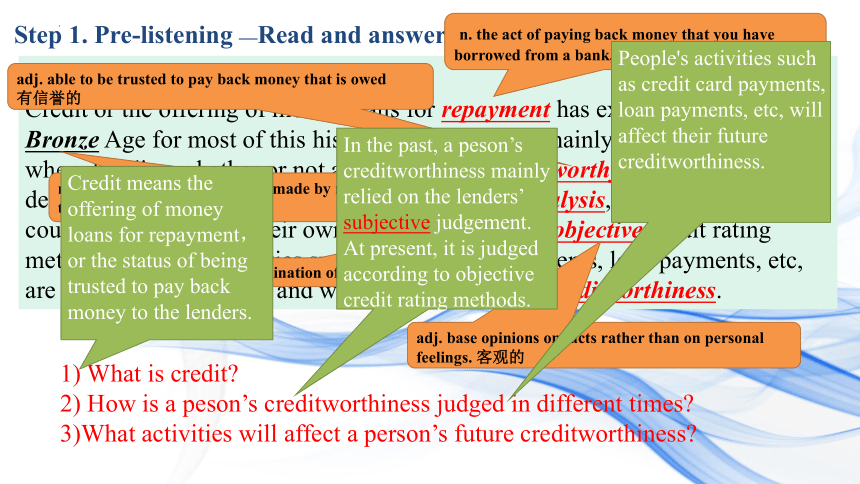
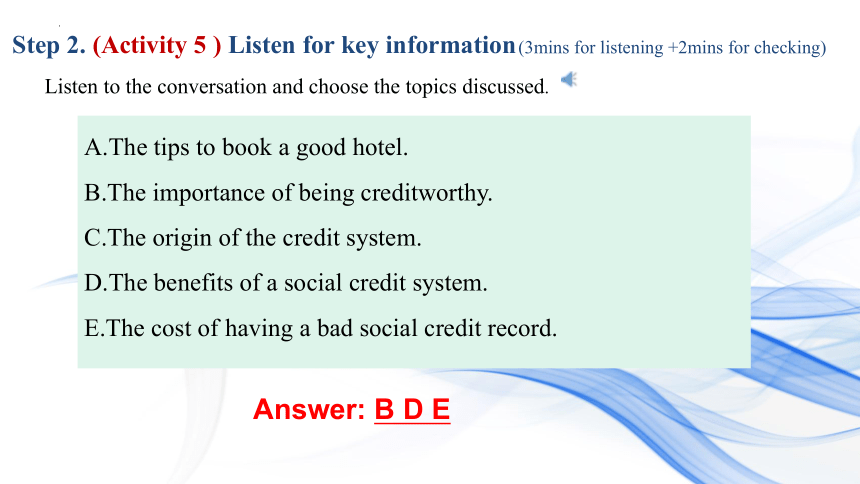
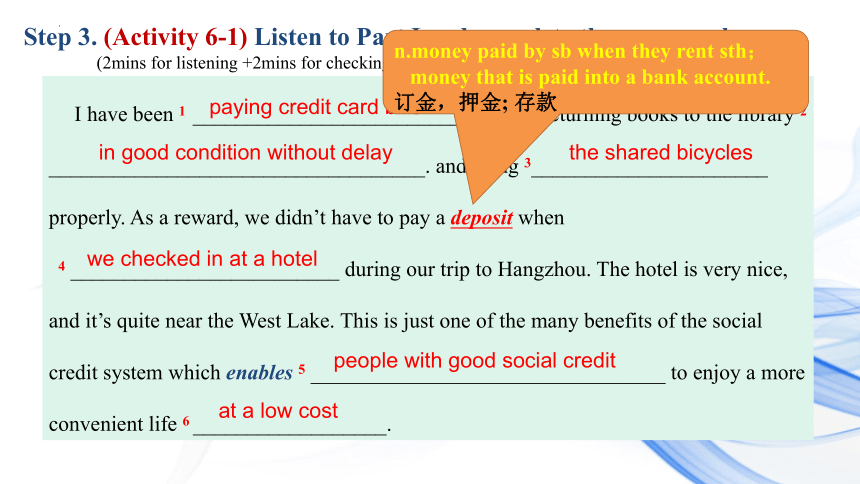
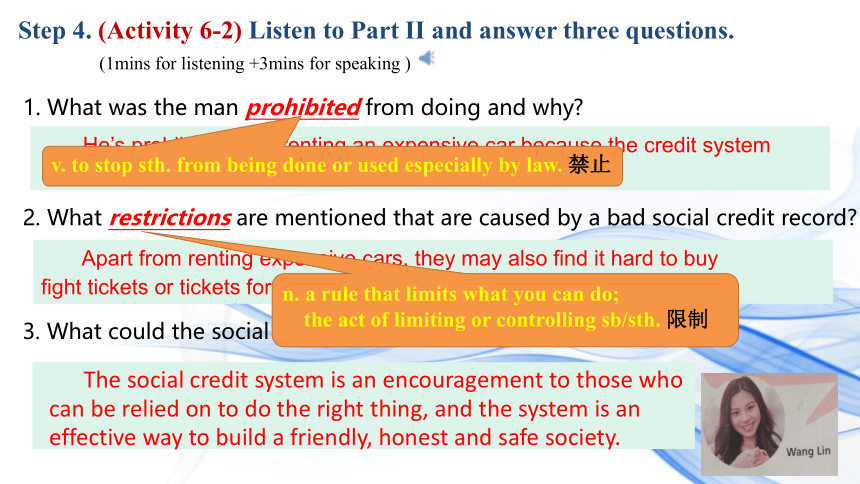
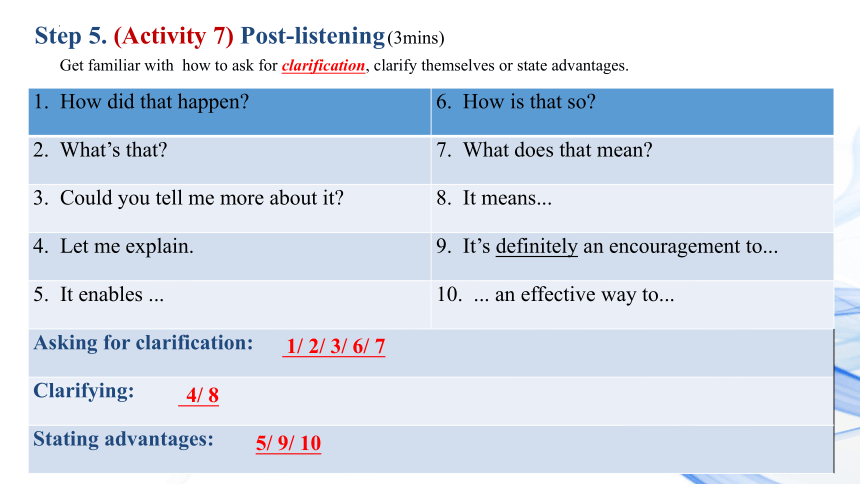
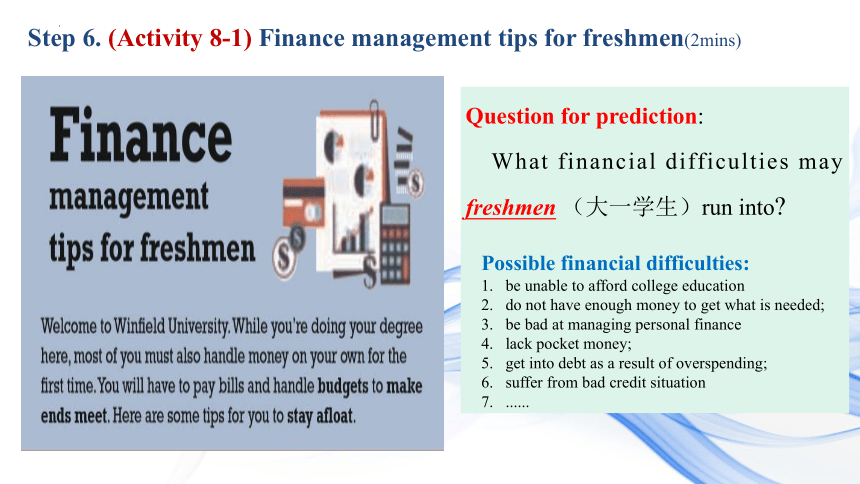
文档简介
(共14张PPT)
Unit 4 Everyday economics
Listening and speaking
—Personal finance mamagement
Step 1. Pre-listening —Read and answer questions (5mins)
1) What is credit
2) How is a peson’s creditworthiness judged in different times
3)What activities will affect a person’s future creditworthiness
Social credit
Credit or the offering of money loans for repayment has existed since the Bronze Age for most of this history. Lenders relied mainly on their judgement when deciding whether or not a borrower was creditworthy. With the development of information technology and data analysis, more and more countries are building their own credit systems with objective credit rating methods. People's activities such as credit card payments, loan payments, etc, are recorded and scored, and will affect their future creditworthiness.
n. the act of paying back money that you have borrowed from a bank, etc. 偿还
adj. able to be trusted to pay back money that is owed
有信誉的
n. a dark reddish-brown metal made by mixing copper and tin 青铜
the detailed study or examination of sth. 分析
adj. base opinions on facts rather than on personal feelings. 客观的
Credit means the offering of money loans for repayment, or the status of being trusted to pay back money to the lenders.
In the past, a peson’s creditworthiness mainly relied on the lenders’ subjective judgement. At present, it is judged according to objective credit rating methods.
People's activities such as credit card payments, loan payments, etc, will affect their future creditworthiness.
Step 2. (Activity 5 ) Listen for key information (3mins for listening +2mins for checking)
Listen to the conversation and choose the topics discussed.
Answer: B D E
The tips to book a good hotel.
The importance of being creditworthy.
The origin of the credit system.
The benefits of a social credit system.
The cost of having a bad social credit record.
Step 3. (Activity 6-1) Listen to Part I and complete the paragraph.
(2mins for listening +2mins for checking)
I have been 1 _________________________ on time, returning books to the library 2 ___________________________________. and using 3______________________ properly. As a reward, we didn’t have to pay a deposit when
4 _________________________ during our trip to Hangzhou. The hotel is very nice, and it’s quite near the West Lake. This is just one of the many benefits of the social credit system which enables 5 _________________________________ to enjoy a more convenient life 6 __________________.
paying credit card bills
in good condition without delay
the shared bicycles
we checked in at a hotel
people with good social credit
at a low cost
money paid by sb when they rent sth;
money that is paid into a bank account. 订金,押金; 存款
1. What was the man prohibited from doing and why
2. What restrictions are mentioned that are caused by a bad social credit record
Step 4. (Activity 6-2) Listen to Part II and answer three questions.
(1mins for listening +3mins for speaking )
3. What could the social credit system contribute to
He’s prohibited from renting an expensive car because the credit system showed that he’s a laolai.
Apart from renting expensive cars, they may also find it hard to buy fight tickets or tickets for high-speed rail services, among other things.
The social credit system is an encouragement to those who can be relied on to do the right thing, and the system is an effective way to build a friendly, honest and safe society.
v. to stop sth. from being done or used especially by law. 禁止
n. a rule that limits what you can do;
the act of limiting or controlling sb/sth. 限制
Step 5. (Activity 7) Post-listening (3mins)
Get familiar with how to ask for clarification, clarify themselves or state advantages.
1. How did that happen 6. How is that so
2. What’s that 7. What does that mean
3. Could you tell me more about it 8. It means...
4. Let me explain. 9. It’s definitely an encouragement to...
5. It enables ... 10. ... an effective way to...
Asking for clarification: Clarifying: Stating advantages: 1/ 2/ 3/ 6/ 7
4/ 8
5/ 9/ 10
Step 6. (Activity 8-1) Finance management tips for freshmen(2mins)
Question for prediction:
What financial difficulties may freshmen (大一学生)run into
Possible financial difficulties:
be unable to afford college education
do not have enough money to get what is needed;
be bad at managing personal finance
lack pocket money;
get into debt as a result of overspending;
suffer from bad credit situation
......
Step 6. (Activity 8-2) Read the leaflet and answer the questions (6mins)
What suggestions are given to help students save money
2. What do you need to pay attention to when spending money
3. What do you need to bear in mind when making extra money
Make sure it doesn’t interfere with your studies, and pay any tax as required by law.
Find the banking services that meet your needs and will help you save money. Save a small amount each week from now on, and increase it each month.
What suggestions are given to help students save money
2. What do you need to pay attention to when spending money
3. What do you need to bear in mind when making extra money
Be careful when opening your first credit card account. Look for a card with good benefits and no annual fees. Always make payments on time. Make rational spending choices and never exceed your agreed credit limit. Avoid luxuries so that you don’t go into debt.
adj. happening or done once every year. 每年的;一年一次的
adj. based on reason rather than emotions. 合理的;理性的;明智的
Step 6. (Activity 8-2) Read the leaflet and answer the questions (6mins)
v. to get involved in and try to influence a situation in a way that annoys other people 干涉;干预;介入
v. to be greater than a particular number or amount; go beyond 超过(数量)
n. a thing that is expensive and enjoyable but not essential. 奢侈品
1 ____________: the amount of money needed or available for certain purposes
2 ____________: to have enough money to buy what you need to live
3 ____________: to be out of debt or financial difficulty
4 ____________: money paid to the government, usually a percentage of personal
income or of the cost of goods
5 ____________: to accumulate the quality of being creditworthy
6 ____________: the maximum amount of money that may be borrowed under
a credit arrangement
7 ____________: to get into the state of owing money
8 ____________: costs automatically charged once a year to your credit card account
9 ____________: the amount of money charged by a bank when you borrow money, or
paid to you when you keep money in an account
Step 7. (Activity 9-1) Match the words and expressions in Activity 8 to their meanings(4mins)
budget
make ends meet
stay afloat
tax
building credit
agreed credit limit
get into debt
annual fee
interest
v. to gradually increase
in number or quantity. 积累
v. be in debt . 欠钱/情; 应把…归因于
Step 7. (Activity 9-2) Word bank (4mins)
Consolidation for words and expressions associated with mangaing personal finance
Personal finance management
Exceed agreed credit limit
Make rational spending choices
Pay tax
Pay annual fees
Deposit money in the bank
Stay afloat
Over budget
Within budget
Pocket money
Do part-time jobs
Interest
Get into debt
Budget
Build credit
Make ends meet
Save money
Work in groups and discuss how to manage your finances and maintain a good social credit record as high school students.
Step 8. (Activity 10) Discussion(5mins)
Available expressions:
Always spend within budgets so as to make ends meet.
Spending less than what you have is an effective way to avoid getting into debt.
Do part-time jobs to make some extra money and save pocket money for a rainy day.
When borrowing books from the library, remember to return them in good condition without delay.
Use shared bikes or power banks properly.
……
Design a leaflet on the topic of how to manage personal finances and maintain a good social credit record for high school students based on what have been learned in class. Use as many words and expressions mentioned above as possible.
Tkanks for your linstening!
Unit 4 Everyday economics
Listening and speaking
—Personal finance mamagement
Step 1. Pre-listening —Read and answer questions (5mins)
1) What is credit
2) How is a peson’s creditworthiness judged in different times
3)What activities will affect a person’s future creditworthiness
Social credit
Credit or the offering of money loans for repayment has existed since the Bronze Age for most of this history. Lenders relied mainly on their judgement when deciding whether or not a borrower was creditworthy. With the development of information technology and data analysis, more and more countries are building their own credit systems with objective credit rating methods. People's activities such as credit card payments, loan payments, etc, are recorded and scored, and will affect their future creditworthiness.
n. the act of paying back money that you have borrowed from a bank, etc. 偿还
adj. able to be trusted to pay back money that is owed
有信誉的
n. a dark reddish-brown metal made by mixing copper and tin 青铜
the detailed study or examination of sth. 分析
adj. base opinions on facts rather than on personal feelings. 客观的
Credit means the offering of money loans for repayment, or the status of being trusted to pay back money to the lenders.
In the past, a peson’s creditworthiness mainly relied on the lenders’ subjective judgement. At present, it is judged according to objective credit rating methods.
People's activities such as credit card payments, loan payments, etc, will affect their future creditworthiness.
Step 2. (Activity 5 ) Listen for key information (3mins for listening +2mins for checking)
Listen to the conversation and choose the topics discussed.
Answer: B D E
The tips to book a good hotel.
The importance of being creditworthy.
The origin of the credit system.
The benefits of a social credit system.
The cost of having a bad social credit record.
Step 3. (Activity 6-1) Listen to Part I and complete the paragraph.
(2mins for listening +2mins for checking)
I have been 1 _________________________ on time, returning books to the library 2 ___________________________________. and using 3______________________ properly. As a reward, we didn’t have to pay a deposit when
4 _________________________ during our trip to Hangzhou. The hotel is very nice, and it’s quite near the West Lake. This is just one of the many benefits of the social credit system which enables 5 _________________________________ to enjoy a more convenient life 6 __________________.
paying credit card bills
in good condition without delay
the shared bicycles
we checked in at a hotel
people with good social credit
at a low cost
money paid by sb when they rent sth;
money that is paid into a bank account. 订金,押金; 存款
1. What was the man prohibited from doing and why
2. What restrictions are mentioned that are caused by a bad social credit record
Step 4. (Activity 6-2) Listen to Part II and answer three questions.
(1mins for listening +3mins for speaking )
3. What could the social credit system contribute to
He’s prohibited from renting an expensive car because the credit system showed that he’s a laolai.
Apart from renting expensive cars, they may also find it hard to buy fight tickets or tickets for high-speed rail services, among other things.
The social credit system is an encouragement to those who can be relied on to do the right thing, and the system is an effective way to build a friendly, honest and safe society.
v. to stop sth. from being done or used especially by law. 禁止
n. a rule that limits what you can do;
the act of limiting or controlling sb/sth. 限制
Step 5. (Activity 7) Post-listening (3mins)
Get familiar with how to ask for clarification, clarify themselves or state advantages.
1. How did that happen 6. How is that so
2. What’s that 7. What does that mean
3. Could you tell me more about it 8. It means...
4. Let me explain. 9. It’s definitely an encouragement to...
5. It enables ... 10. ... an effective way to...
Asking for clarification: Clarifying: Stating advantages: 1/ 2/ 3/ 6/ 7
4/ 8
5/ 9/ 10
Step 6. (Activity 8-1) Finance management tips for freshmen(2mins)
Question for prediction:
What financial difficulties may freshmen (大一学生)run into
Possible financial difficulties:
be unable to afford college education
do not have enough money to get what is needed;
be bad at managing personal finance
lack pocket money;
get into debt as a result of overspending;
suffer from bad credit situation
......
Step 6. (Activity 8-2) Read the leaflet and answer the questions (6mins)
What suggestions are given to help students save money
2. What do you need to pay attention to when spending money
3. What do you need to bear in mind when making extra money
Make sure it doesn’t interfere with your studies, and pay any tax as required by law.
Find the banking services that meet your needs and will help you save money. Save a small amount each week from now on, and increase it each month.
What suggestions are given to help students save money
2. What do you need to pay attention to when spending money
3. What do you need to bear in mind when making extra money
Be careful when opening your first credit card account. Look for a card with good benefits and no annual fees. Always make payments on time. Make rational spending choices and never exceed your agreed credit limit. Avoid luxuries so that you don’t go into debt.
adj. happening or done once every year. 每年的;一年一次的
adj. based on reason rather than emotions. 合理的;理性的;明智的
Step 6. (Activity 8-2) Read the leaflet and answer the questions (6mins)
v. to get involved in and try to influence a situation in a way that annoys other people 干涉;干预;介入
v. to be greater than a particular number or amount; go beyond 超过(数量)
n. a thing that is expensive and enjoyable but not essential. 奢侈品
1 ____________: the amount of money needed or available for certain purposes
2 ____________: to have enough money to buy what you need to live
3 ____________: to be out of debt or financial difficulty
4 ____________: money paid to the government, usually a percentage of personal
income or of the cost of goods
5 ____________: to accumulate the quality of being creditworthy
6 ____________: the maximum amount of money that may be borrowed under
a credit arrangement
7 ____________: to get into the state of owing money
8 ____________: costs automatically charged once a year to your credit card account
9 ____________: the amount of money charged by a bank when you borrow money, or
paid to you when you keep money in an account
Step 7. (Activity 9-1) Match the words and expressions in Activity 8 to their meanings(4mins)
budget
make ends meet
stay afloat
tax
building credit
agreed credit limit
get into debt
annual fee
interest
v. to gradually increase
in number or quantity. 积累
v. be in debt . 欠钱/情; 应把…归因于
Step 7. (Activity 9-2) Word bank (4mins)
Consolidation for words and expressions associated with mangaing personal finance
Personal finance management
Exceed agreed credit limit
Make rational spending choices
Pay tax
Pay annual fees
Deposit money in the bank
Stay afloat
Over budget
Within budget
Pocket money
Do part-time jobs
Interest
Get into debt
Budget
Build credit
Make ends meet
Save money
Work in groups and discuss how to manage your finances and maintain a good social credit record as high school students.
Step 8. (Activity 10) Discussion(5mins)
Available expressions:
Always spend within budgets so as to make ends meet.
Spending less than what you have is an effective way to avoid getting into debt.
Do part-time jobs to make some extra money and save pocket money for a rainy day.
When borrowing books from the library, remember to return them in good condition without delay.
Use shared bikes or power banks properly.
……
Design a leaflet on the topic of how to manage personal finances and maintain a good social credit record for high school students based on what have been learned in class. Use as many words and expressions mentioned above as possible.
Tkanks for your linstening!
